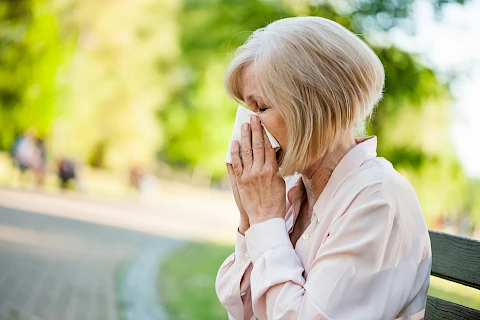
When the autumn season arrives, many seniors might face the common dilemma: "Is this a cold, or are these just seasonal allergies?". Understanding their difference can be the basis for proper treatment and relief. Differentiating between allergies and colds can help seniors manage their symptoms more effectively and maintain overall health.
What Are Seasonal Allergies?
Seasonal allergies, often known as hay fever, can be a real bother in the autumn. Common triggers include ragweed pollen, mold spores, and dust mites, which become more prevalent during the fall. Seniors experiencing seasonal allergies might notice sneezing, itchy or watery eyes, runny or stuffy nose, and itchy throat or ears. These symptoms typically occur in a pattern, either lingering for weeks or coming and going with exposure to allergens.
Recognizing Cold Symptoms
Colds, caused by various viruses, are also common in the colder months. They can come on suddenly and bring about different symptoms. Seniors with a cold might experience a sore throat, persistent cough, nasal congestion, slight fever, and body aches. Unlike allergies, cold symptoms usually develop over a few days, last a week to ten days, and tend to improve without requiring extended medical treatment.
Key Differences Between Allergies and Colds
To better understand the differences between allergies and colds, you must consider symptom onset, duration, and specific symptoms. Allergies often have a quick onset after exposure to allergens, while colds develop more gradually. Allergies can last weeks or longer, whereas colds typically clear up within one to two weeks. Colds often come with a slight fever and body aches, which are not generally associated with allergies.
Treatment Options for Seasonal Allergies
Several effective treatments can help deal with seasonal allergies. Options include:
- Over-the-counter medications such as antihistamines and nasal sprays
- Home remedies like using a humidifier, drinking plenty of fluids, and rinsing nasal passages with saline solutions
- When symptoms are severe, it's a good idea to speak with a doctor who may recommend prescription medications or allergy shots
Treatment Options for Colds
While there's no cure for the common cold, managing symptoms can make you feel better. Over-the-counter remedies like decongestants, cough suppressants, and pain relievers can provide relief. Home care approaches such as rest, staying hydrated, and consuming hot soups and teas are also beneficial. If symptoms are persistent or severe, it's wise to consult a doctor, especially if there's a high fever or if the cold lasts longer than two weeks.
Preventative Measures
Preventing colds and allergies involves a mix of healthy habits and environmental controls. To reduce allergen exposure, keep windows closed during high pollen days, use air purifiers, and change and clean filters regularly to avoid mold and dust build-up. To prevent catching a cold, wash hands frequently, avoid close contact with infected individuals, and maintain a healthy diet. Adopting a healthy lifestyle, maintaining good hygiene, and staying informed about local allergen levels can help seniors avoid these seasonal annoyances
Senior Helpers Stillwater Assists Seniors With Daily Living Activities
Recognizing whether you're dealing with allergies or a cold comes down to understanding the different symptoms and their patterns. Seasonal allergies and colds share many symptoms but differ in causes and duration. If you or a loved one in Stillwater, Bayport, North St. Paul, or Scandia need assistance managing health concerns, contact Senior Helpers Stillwater for support. Seeking professional advice ensures your health is well-managed and helps maintain quality of life.